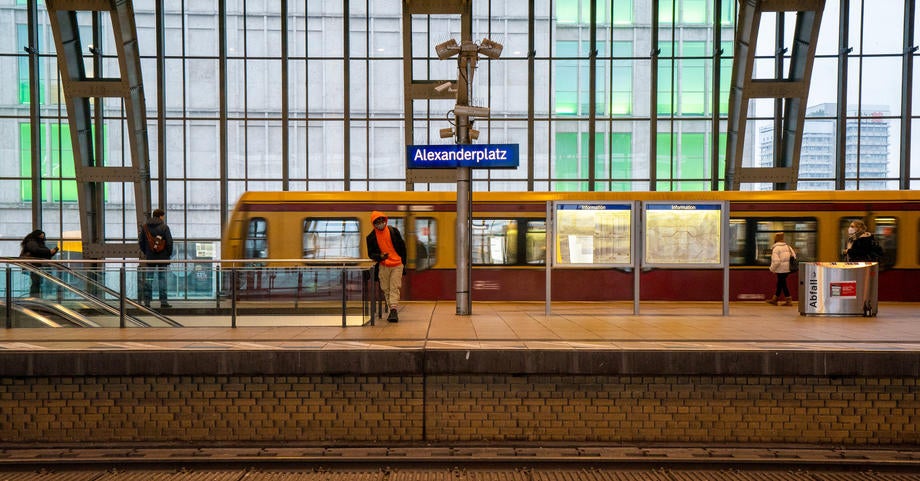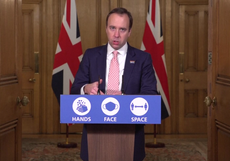Covid: Germany begins hard lockdown ahead of Christmas, as Paris streets empty
Germany has brought in tough new lockdown restrictions as France implements a night-time curfew.

Your support helps us to tell the story
From reproductive rights to climate change to Big Tech, The Independent is on the ground when the story is developing. Whether it's investigating the financials of Elon Musk's pro-Trump PAC or producing our latest documentary, 'The A Word', which shines a light on the American women fighting for reproductive rights, we know how important it is to parse out the facts from the messaging.
At such a critical moment in US history, we need reporters on the ground. Your donation allows us to keep sending journalists to speak to both sides of the story.
The Independent is trusted by Americans across the entire political spectrum. And unlike many other quality news outlets, we choose not to lock Americans out of our reporting and analysis with paywalls. We believe quality journalism should be available to everyone, paid for by those who can afford it.
Your support makes all the difference.Germany has shut schools and non-essential businesses in a strict lockdown to try and bring under control soaring coronavirus cases.
The fresh restrictions will be in place until January 10, but there will be a slight easing of measures over Christmas allowing one household to have up to four family members.
The country reported 952 deaths, the highest increase yet, along with 27,728 new cases on Wednesday.
Fears of the pandemic spiralling out of control drew swift action from Chancellor Angela Merkel and 16 state governors who announced the tough new restrictions on Sunday.
Ms Merkel told lawmakers on Tuesday she was worried by the upward trend in coronavirus infections and warned them that January and February would be very tough months.
Other European countries have also tightened restrictions after a rise in cases, with England in a strict tier system, France introducing a night-time curfew and the Netherlands currently in a five week lockdown.
Germany was more successful than many European countries in keeping the coronavirus under control in the first wave in the spring but the situation looks very different now.
The country entered a “lockdown light” in November but Ms Merkel said at the weekend it had not been enough to bring the virus under control.
Under Germany’s new restrictions only essential businesses such as supermarkets and banks will remain open.
Lothar Wieler, head of Germany's Robert Koch Institute, warned that the case numbers would still go up for some time after Germany heads into lockdown on Wednesday.
He expressed worry that especially older people and residents of nursing homes are facing high infection figures again.
"The age group of those older than 80 are getting more and more affected, and those are the people who get severely ill or die," Mr Wieler said.
The Robert Koch Institute put the number of confirmed coronavirus cases at 1,379,238, an increase of 27,728. The total death toll in Germany is 23,427.
Germans are waiting for regulatory approval for a vaccine partly developed in Germany even as other countries, including Britain and the United States, are rolling it out.
Health Minister Jens Spahn has said Germany should start giving coronavirus shots 24 to 72 hours after the vaccine by BioNTech and Pfizer gets EU approval and could begin as soon as Christmas. European authorities are expected to approve the vaccine next week.
What are other European countries doing to control the virus?
France has replaced its lockdown with a nightly curfew that runs from 8:00 p.m until 6:00 a.m.
People can only go out for work or medical reasons during the curfew and must have an authorisation form or they can be fined. Christmas Eve is the only day that will be exempt from the restrictions.
Despite the onerous new curfew, the stay-at-home order that was previously in place was lifted on Tuesday.
This had meant that, around the clock, people could only venture out for a limited time and for essential trips, to shop, or to exercise.
Infection rates in France have declined sharply since the peak of the second wave last month. But scientists warn of the risk of a third wave of infection if people let down their guard during the Christmas and New Year holidays.
In the Netherlands, Prime Minister Mark Rutte on Monday night announced a tough second lockdown in the Netherlands, in a push to drive down the coronavirus infection rate, which has rapidly moved back to record levels in the past week.
All schools and non-essential shops in the country of 17 million will be closed for at least five weeks, along with hairdressers, beauty salons, gyms, museums, zoos and other public spaces.
The number of new coronavirus infections in the Netherlands jumped by 36 per cent in the week through Tuesday to 58,412, Dutch national health institute RIVM said, while Covid-19 related hospital admissions rose by 20 per cent.
Restrictions in the country will be eased a little bit in the three days over Christmas with households allowed three guests instead of two.
Meanwhile, in Italy the government is considering toughening coronavirus restrictions amid a warning from an adviser from the country’s health ministry.
"We are in a war situation, people don't realise it but the last time we had this many deaths, bombs were dropping on our cities during the war," public health professor Walter Ricciardi told the television channel la7 on Tuesday evening.
Mr Ricciardi, the adviser to Health Minister Roberto Speranza, said the government should lock down the main cities completely.
Italy reported 846 COVID-19 deaths on Tuesday, taking the official total to 65,857, the fifth highest in the world.






Join our commenting forum
Join thought-provoking conversations, follow other Independent readers and see their replies
Comments